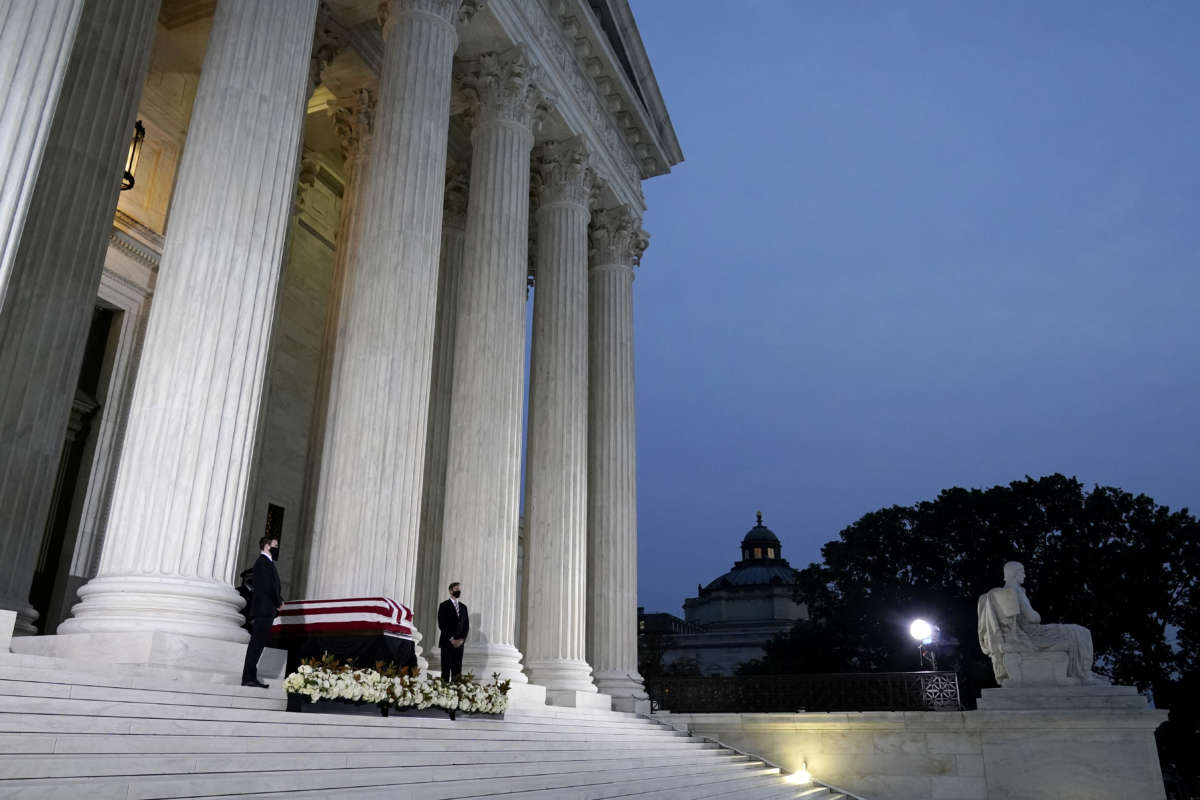Honest, paywall-free news is rare. Please support our boldly independent journalism with a donation of any size.
Democratic lawmakers have drafted a bill that, if passed, would limit the tenures of Supreme Court justices on the bench to just 18 years.
In the wake of a highly contentious battle set to commence over the replacement of the late Justice Ruth Bader Ginsburg, who died on September 18 from complications due to pancreatic cancer, those pushing for the reform to the high court believe that it will mitigate future politicization of the institution by limiting the number of appointments made by presidents to just twice every four-year presidential term.
The legislation is set to be introduced by three members of Congress, Representatives Ro Khanna (D-California), Joe Kennedy III (D-Massachusetts) and Don Beyer (D-Virginia).
Limiting how long justices could serve on the court to just 18 years “would save the country a lot of agony and help lower the temperature over fights for the court that go to the fault lines of cultural issues and is one of the primary things tearing at our social fabric,” Khanna said in a statement.
It’s unlikely that the bill will go anywhere during this term of Congress. While it might pass the Democratic-controlled House, the Republican-controlled Senate will more than likely oppose the idea. Even if it’s passed by both houses of Congress, it would still need the signature of President Trump, who may veto it, believing he could make more appointments in a future term in office should he win reelection in November. (If Trump is successful in appointing a replacement for Ginsburg, he will have made three appointments to the Supreme Court within a single four-year term.)
Critics of the idea have also suggested that it’s unconstitutional. However, the way the bill is framed may actually allow for changes to the court without the need for states to ratify a constitutional amendment, by giving retiring justices “senior” status. In this way, justices would not technically be retired, and would be allowed to hold onto their title as justice while not actually serving on the bench to take part in decisions. They may also rotate to lower circuit courts after taking senior status, if they wish to do so.
The plan — and its justification for avoiding the need for a constitutional amendment — is similar to one advocated in a CNN opinion article written last year by Ruth-Helen Vassilas, an associate at the London law office of Skadden, Arps, Slate, Meagher & Flom LLP; and Kermit Roosevelt, a professor at University of Pennsylvania Law School (and the great-great-grandson of President Theodore Roosevelt).
“This proposal is lawful under the Constitution,” the two wrote in 2019. “First, Congress has the authority to change the size of the court and has done so repeatedly throughout history. Second, federal judges are constitutionally entitled to ‘hold their offices’ during good behavior and not have their salaries reduced. This plan does not diminish salaries, and it is consistent with a current US law (28 US Code § 371(b)) that states explicitly that district and circuit judges who take senior status ‘retain the office.’ It follows that our legislators can assign senior status to justices, as well.”
The idea has widespread support, too. A poll conducted in May by the reform advocacy group Fix the Court found that 77 percent of Americans strongly or somewhat support restrictions for how long justices can serve on the Supreme Court, while only 23 percent are against creating such limits.
Support for tenure limits transcends partisan lines, too: In that same poll, 78 percent of Democrats supported the idea, while 79 percent of Republicans backed it as well.
At least three current justices, Fix the Court has also noted, also seem receptive to the plan. Both Justices Elena Kagan and Stephan Breyer, members of the liberal bloc of justices on the Supreme Court, have made comments supporting tenure limits within the past five years. Chief Justice John Roberts, working within the Reagan administration in 1983, also suggested the reform would be beneficial.
“A judge insulated from the normal currents of life for 25 or 30 years was a rarity then, but is becoming commonplace today. Setting a term of, say, 15 years would ensure that federal judges would not lose all touch with reality through decades of ivory tower existence,” Roberts wrote at the time.
Press freedom is under attack
As Trump cracks down on political speech, independent media is increasingly necessary.
Truthout produces reporting you won’t see in the mainstream: journalism from the frontlines of global conflict, interviews with grassroots movement leaders, high-quality legal analysis and more.
Our work is possible thanks to reader support. Help Truthout catalyze change and social justice — make a tax-deductible monthly or one-time donation today.
